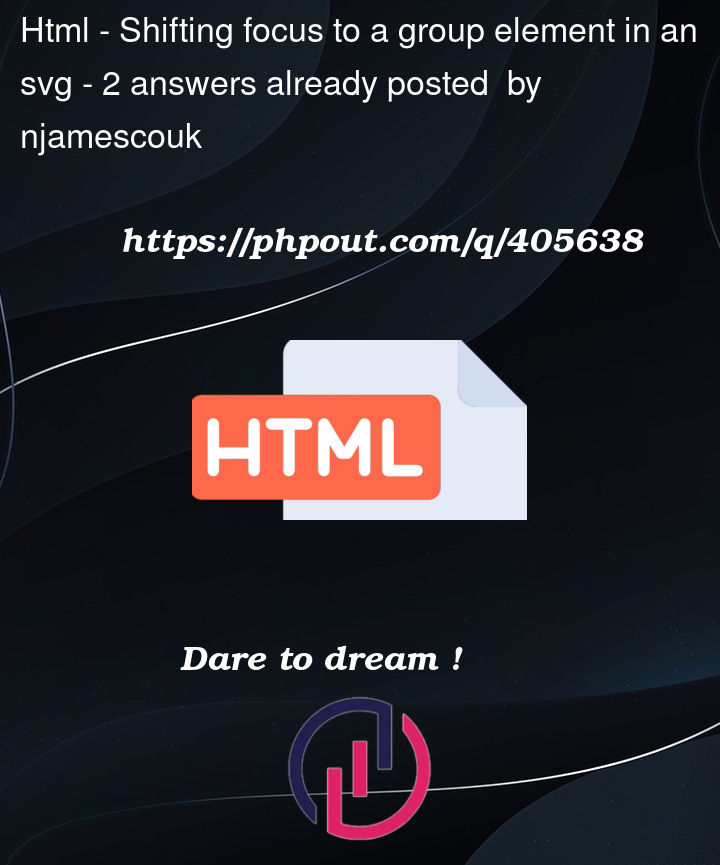Shifting focus to a group element in an svg
I have a tall and wide svg, generated by graphviz.
If I open the svg with a browser I can search for
text and focus will move to show the sought text.
I wish to emulate this behaviour by putting a link
to a svg fragment in an html file. So if I have file.svg
containing <g id="sought"><text>goes here</text></g>
the link would look like <a href="file.svg#sought">.
This doesn’t have the desired effect.
Experimentation reveals that a link to a svg file
containing <rect id="sought" /> will make
the browser move focus to the rect concerned.
I appreciate I may be asking for the impossible here,
but if there’s an answer that doesn’t involve changing the
svg I’d like to hear about it.
Minimal example follows:
pic.svg
<?xml version="1.0"
encoding="UTF-8"
standalone="no"?>
<svg
xmlns:svg="http://www.w3.org/2000/svg"
xmlns="http://www.w3.org/2000/svg"
version="1.1"
width="6000" height="6000" y="0" x="0">
<rect id="black" fill="black" height="100" width="100" y="50" x="5500" />
<text y="50" x="5500">black</text>
<rect id="red" fill="red" height="100" width="100" y="5500" x="5500" />
<text y="5500" x="5500">red</text>
<g id="green">
<rect fill="green" height="100" width="100" y="5500" x="50" />
<text y="5500" x="50">green</text>
</g>
</svg>
svglink.html
<!DOCTYPE html>
<html >
<head>
<meta http-equiv="Content-Type" content="text/html; charset=utf-8" />
<meta name="viewport" content="width=device-width, initial-scale=1.0" />
<style>
body
{
width: 20em;
height: 10em;
text-align: left;
}
</style>
</head>
<body >
<span>links to pic.svg: </span>
<ul>
<li><a href="pic.svg#red">red rect</a></li>
<li><a href="pic.svg#green">green group</a></li>
</ul>
</body>
</html>
Please note:
-
following the
red rectlink reveals the red rectangle in pic.svg. -
following the
green grouplink doesn’t reveal the green rectangle contained in the group -
ctrl-f red|green|black when browsing pic.svg shifts focus to to the text, as desired.
This may well be by design, but I haven’t found any documentation
for this.
Modifying the html, perhaps scripting a button to reveal the group would be an option?




2
Answers
Embed the svg in a page and it works
So have a link to
embeddedsvg.html#redApparently some browser can only scroll/jump to SVG rendered elements with geometry properties. While you can retrieve position or bounding box data for a
<g>(e.g viagetBBox()element it doesn’t have intrinsic dimensions.scrollIntoView()A workaround might be to override the default scroll in view behaviour and replace it via JavaScript
scrollIntoView()method.target.scrollIntoView()suffers from the same limitations. However, we can tweak the target selection:If a targeted element is not of the type
path,line,rect,polyline,polygon,circle,ellipse,useortext– so for instance a<g>– we query for the next child element in this class to define it as the scroll target.This approach requires your SVG to be embedded in a HTML document. However, you could probably also add the script to your SVG (probably not very feasible).
scrollTo()An alternative would be to retrieve the target’s screen coordinates via
getBoundingClientRect()and scroll to this position viascrollTo()